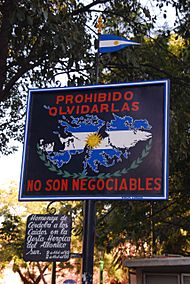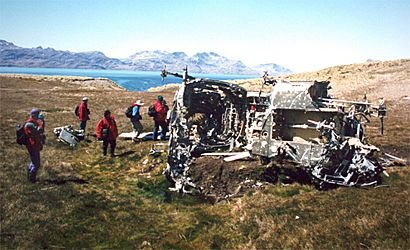Aftermath of the Falklands War facts for kids
The 1982 Falklands War was a short but important conflict between the United Kingdom and Argentina. After the war ended, it changed many things around the world. It affected how countries worked together, the way people thought about politics in Argentina and the UK, military strategies, and even how doctors treated injuries. Most importantly, it deeply impacted the lives of everyone who was involved in the fighting.
Contents
Political Changes After the War
After the war, it took a while for the UK and Argentina to become friends again. They finally started talking in 1989. They agreed to discuss other important topics, but they put the main issue of who owned the islands (called sovereignty) to one side for future talks. This was known as the sovereignty umbrella.
How Argentina Changed

Argentina's loss in the war led to big protests against its military government, known as the military junta. This government had taken power in 1976 and had committed serious crimes. The war's defeat was the final push that forced the military leaders out.
The leader, Galtieri, had to resign. New elections were held on October 30, 1983. A new president, Raúl Alfonsín, from the Radical Civic Union (UCR) party, took office on December 10, 1983. He won against Italo Luder, who was from the Justicialist Party (also known as the Peronist movement). Over time, this defeat ended the military's involvement in Argentine politics, which had been happening since the 1930s. It also changed the Peronist party's strong hold on elections since 1945.
In 2009, Argentine officials started looking into claims that some officers and corporals had treated their young soldiers badly during the war. There were reports of soldiers being harmed. However, there were also claims that some of the evidence used was not true.
How the Falkland Islands Changed
The Falkland Islands are still a self-governing British territory. This means they manage their own affairs but are connected to the UK. After the war, a law called the British Nationality (Falkland Islands) Act 1983 gave the Islanders British citizenship. This made their connection to the UK even stronger.
The Islands' economy also got a boost. The UK invested money in the military there, and the fishing industry grew. The war made the future of the Falkland Islanders' link to the UK much clearer. The Islands' government still wants to decide its own future and remain under British rule. Very few civilians died during the war.
How the United Kingdom Changed
For the United Kingdom, the war was costly. It lost 258 people, 6 ships, and 34 aircraft. The war cost about £2.778 billion (which would be about £9.255 billion today). However, the campaign was seen as a big victory for the UK.
In the months after the war, the popularity of the Conservative government, led by Prime Minister Margaret Thatcher, grew a lot. Some people thought this was because of the war's success. Others believed it was due to better economic times, with the war even helping to increase productivity.
However, some government members did resign. For example, the Foreign Secretary, Lord Carrington, stepped down. This was because his department had not expected the war to happen.
The successful end of the war made British people feel very patriotic. This feeling was called the "Falklands Factor." Before the war, after the 1956 Suez campaign and the end of the Empire, Britain had felt unsure about its place in the world. With the war won, Margaret Thatcher was re-elected with a larger majority. This gave her the power to continue her economic changes, known as Thatcherism.
Another important result was that the "special relationship" between the US and the UK became stronger. Both US President Ronald Reagan and his Secretary of Defense, Caspar Weinberger, were given special honors by the UK for their help during the war. This also led to Britain and the US working more closely together against the Soviet bloc during the Second Cold War.
In 2007, the British government expressed sadness over the deaths on both sides during the war. Margaret Thatcher said the victory gave hope and strength. Former Argentine President Néstor Kirchner said the UK won a "colonial victory" and promised the islands would one day return to Argentina. However, he also said that force would never be used again to achieve this.
How the USA and Latin America Changed
The United States' reputation in some parts of Latin America was hurt. This was because people thought the US had broken a treaty (the Rio Treaty) by giving military supplies to the UK.
In September 2001, the then President of Mexico, Vicente Fox, said the Falklands War showed that this treaty had failed.
While most South American governments (except Chile) publicly supported Argentina, many were privately happy with the war's outcome. This was because Argentina had been aggressive towards Chile over a border dispute and had interfered in other countries. So, some countries like Brazil were worried about having a successful and aggressive Argentina as a neighbor.
For Chile, which had a long-standing land dispute with Argentina over the Cape Horn islands, the war's outcome was important. It stopped a planned Argentine military invasion of Chile. It also made it possible for Chile and Argentina to sign a peace treaty in 1984.
The Visit of Pope John Paul II
In May 1982, Pope John Paul II had a planned visit to the United Kingdom. Because of the war, it was decided that he should also make an unplanned trip to Argentina in June. Some believe his presence and words helped prepare Argentines for a possible defeat, which was different from what their government was telling them. He returned to Argentina in 1987 after the country became a democracy again.
See Also
- Aftermath of the Falklands War


